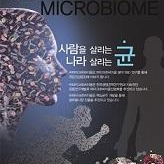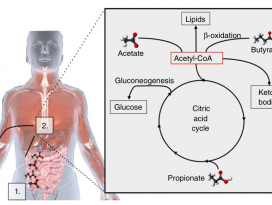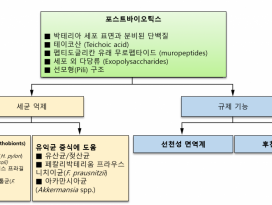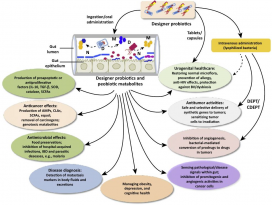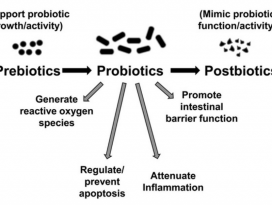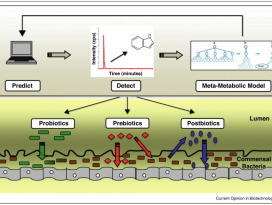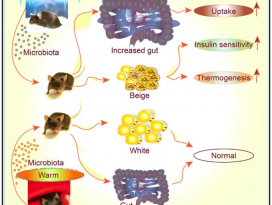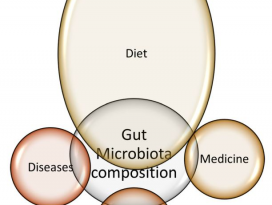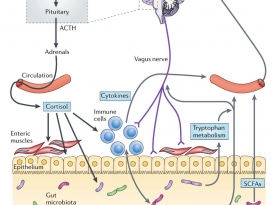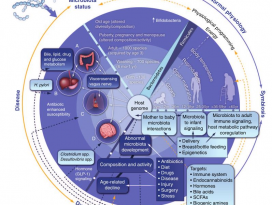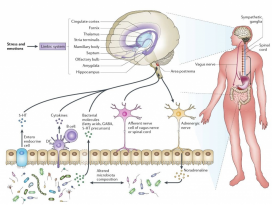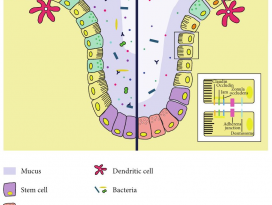[Gut Microbiome] Dysbiosis in the Gut Bacterial Microbiome of Patients with Uveitis, an Inflammatory Disease of the Eye
- e 1333
Dysbiosis inthe Gut Bacterial Microbiome of Patients with Uveitis, an Inflammatory Diseaseof the Eye
Sama Kalyana Chakravarthy, RajagopalaboopathiJayasudha, Gumpili Sai Prashanthi, Mohammed Hasnat Ali, Savitri Sharma, MuditTyagi, Sisinthy Shivaji
| Abstract Uveitis (UVT), an inflammatory disease of the eye significantly contributes to vision impairment and blindness. Uveitis is associated with systemic infectious and autoimmune diseases, but in most cases, the aetiology remains unidentified. Dysbiosis in the gut microbiome has been implicated in autoimmune diseases, inflammatory diseases, cancers and mental disorders. In a mice model of autoimmune UVT, it was observed that manipulating the gut microbiome reduces the inflammation and disease severity. Further, alterations in the bacterial gut microbiome and their metabolites were reported in UVT patients from a Chinese cohort. Hence, it is worth comparing the bacterial gut microbiome of UVT patients with that of healthy controls (HC) to ascertain whether dysbiosis of the gut microbiome has implications in UVT. Our analyses showed reduced diversity of several anti-inflammatory organisms including Faecalibacterium, Bacteroides, Lachnospira, Ruminococcus and members of Lachnospiraceae and Ruminococcaceae families, and enrichment of Prevotella (proinflammatory) and Streptococcus (pathogenic) OTUs in UVT microbiomes compared to HC. In addition, decrease in probiotic and antibacterial organisms was observed in UVT compared to HC microbiomes. Heatmap and PCoA plots also indicated significant variations in the microbiomes of UVT versus HC. This is the first study demonstrating dysbiosis in the gut bacterial communities of UVT patients in an Indian cohort and suggests a role of the gut microbiome in the pathophysiology of UVT. |
제목
포도막염에 걸린 환자의 장내 미생물 불균형과 염증성 안구 질환
내용
눈의 염증성 질환인 포도막염(UVT)은 시각 장애 및 실명의 발병에크게 기여한다. 포도막염은 전염성 및 자가 면역 질환과 관련이 있지만,대부분의 경우 원인은 밝혀지지 않았다. 장내 미생물의 불균형은 자가 면역 질환, 염증성 질환, 암 및 정신 질환에 연루되어 있다. 자가 면역 UVT의 마우스 모델에서, 장내 미생물을 조작하면 염증 및 질병의 심각성이 감소한다는 것이 관찰되었다.나아가, 중국 코호트의 UVT 환자들에서 장내미생물 및 미생물의 대사 산물의 변화가 보고되었다. 따라서 UVT 환자의장내 미생물을 건강한 대조군(HC)의 장내 미생물과 비교하여 장내 미생물 불균형이 UVT에 영향을 미치는지 여부를 확인하는 것은 가치가 있다. 우리의분석에 의하면 패칼리박테리움(Faecalibacterium),박테로이데스(Bacteroides),라크노스피라(Lachnospira),루미노코커스(Ruminococcus)및 래크노스피래세애(Lachnospiraceae)와Ruminococaceae 계통의구성원을 포함한 여러 가지 항 염증성 유기체의 다양성이 감소하였고, HC에 비해 UVT 환자의 미생물에서 프레보텔라(Prevotella) (전 염증성) 및 스트렙토코커스(Streptococcus) (병원성) OUT가 더 풍부했다. 또한,HC보다 UVT의 미생물에서 프로바이오틱 및 항균 유기체의 감소가 관찰되었다. 히트맵(heatmap)과 PCoA플롯은 또한 HC에 비해 UVT의 미생물에 상당한변화를 나타냈다. 본 연구는 인도 코호트에서 UVT 환자의장내 미생물 환경에서의 불균형(dysbiosis)를 입증한 최초의 연구이며, UVT의 병리생리학에서 장내 미생물총의 역할을 제안한다.
Keywords
: #Uveitis #UVT #Dysbiosis #EyeDisorders#EyeDiseases #Probiotics #Microbiome #Microorganisms #Microbes #Microbiota#GutMicrobiome #GutMicrobiota
#포도막염 #장내미생물불균형 #눈질환 #안구질환 #안구질병 #프로바이오틱스 #유익균 #마이크로바이옴 #미생물총 #미생물군 #미생물유전자 #장내미생물 #장내미생물총 #장내미생물군
[출처: Chakravarthy,S. K., Jayasudha, R., Prashanthi, G. S., Ali, M. H., Sharma, S., Tyagi, M.,& Shivaji, S. (2018). Dysbiosis in the Gut Bacterial Microbiome of Patientswith Uveitis, an Inflammatory Disease of the Eye. Indian Journal of Microbiology, 1-13.]
|
| ㈜마이크로바이옴 ㈜마이크로바이옴은 생명공학 최고의 기술력을 바탕으로 마이크로바이옴 산업의 성장과 발전의 선도적 역할을 하고 있는 대한민국 대표 마이크로바이옴 R&D 전문 기업입니다. ㈜마이크로바이옴은 생명공학 국가연구기관인 한국생명공학연구원과 마이크로바이옴 관련 상품에 대하여 공동연구개발 및 기술이전을 통하여 공동특허 출원과 마이크로바이옴 상품화에 성공하였고, 마이크로바이옴 글로벌 기업이 되기 위하여 연구개발을 지속하고 있습니다. |
| no. | 제목 | 조회수 |
|---|
㈜마이크로바이옴 ㅣ 서울시 서대문구 연희로 77-12 영화빌딩2층
Tel :02-322-0302 l Fax : 02-322-0759
Copyright (c) Microbiome. Co. All Rights Reserved.

